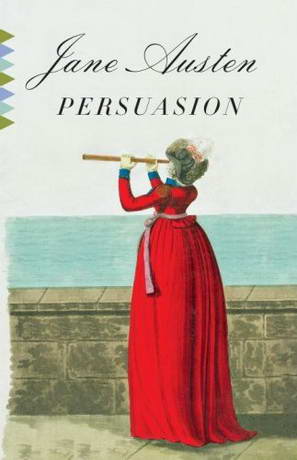While reading, I found Lady Russell’s role in Jane Austen’s Persuasion to be ambiguous and sometimes confusing. When she was first introduced I thought that she would act as a good substitute mother for Anne but as the book continued I found that her motives were not as clear as I originally thought and that, though Anne respects and loves Lady Russell, the only way she can be happy is by ignoring her mentors advice. Susan Peck MacDonald attempts to fit Lady Russell into her theory that “there are three kinds of mothers in Austen’s novels- dead mothers, absent mothers, and flawed (perhaps even obnoxious) mothers” (61). Since Anne already has a dead mother, she suggests that Lady Russell is a flawed mother. I agree with MacDonald and by looking at Lady Russell from this perspective, Lady Russell’s character makes a little more sense.
Lady Russell has no children of her own and is “of a steady age and character, and well provided for, [had] no thought of a second marriage” (Austen 4) and so she seems like she would be an appropriate mother-figure for Anne. Before Lady Elliot’s death, Lady Russell was her best friend and advisor; the narrator also tells us that after the death of Lady Elliot, Anne is left with no ally within her family and Lady Russell tries to take her mother’s place in instructing her and giving her advice. The family respects her and to Lady Russell, Anne is a “highly valued god-daughter, favorite and friend” (Austen 5). However, seven years before the novel takes place, Lady Russell advised Anne to break her engagement to Wentworth because he was in the Navy and did not have a fortune yet. Lady Russell is known by many people to be “able to persuade a person of anything” (Austen 79), but it seems that her advice to Anne was mistaken because within a few years Wentworth made rank and money.Her mistake doesn’t necessarily make her a bad mother-figure, but her ability to persuade Anne of anything become detrimental to Anne’s well-being.
The only marriage that Lady Russell does support is the match between Anne Elliot and her cousin William Elliot. She attempts to persuade Anne into believing this would be the best match for Anne because “the idea of becoming what [Anne’s] mother had been; of having the precious name ‘Lady Elliot’ first revived in herself; of being restored to Kellynch, calling it [Anne’s] home again, her home forever was a charm which [Anne] could not immediately forget” (Austen 123). Here, Lady Russell’s motives, for the first time, are questionable. As MacDonald says Anne “Lady Russell’s inadequacy as a mother substitute is just this- that she would have Anne slavishly copy the past” (Austen 67). There is also something creepy about Lady Russell attempting to mold Anne after her birth-mother. Lady Russell is being selfish and instead of advising Anne to do what is best for her, I felt that Lady Russell was trying to groom Anne to become not only the next Lady Elliot but also her best friend. However, Anne’s “judgment…was against Elliot” (Austen 123), and when Mrs. Smith reveals the truth about Elliot, Anne’s first instinct is that she must confer with Lady Russell about this new development.
At the end of the novel when she decides to marry Captain Wentworth despite the advice she had received from her mentor years earlier, but she still feels that “only one among them, whose opposition of feeling could excite any serious anxiety, was Lady Russell. Anne knew that Lady Russell must be suffering some pain in understanding and relinquishing Mr. Elliot, and be making some struggles to become truly acquainted with, and do justice to Captain Wentworth” (Austen 195). Anne still respects the opinion of her godmother even though “there was nothing less for Lady Russell to do than admit that she had been pretty completely wrong” (Austen 195). MacDonald sums up and explains this phenomenon by noting that “Lady Russell has tried to take the place of Anne’s mother in the courtship process, and the resultant doubling of the motherly role allows the mother herself- and motherhood- not to be denigrated while at the same time Anne must reject her substitute mother’s view of who Anne should marry” (65).
At first I thought it would be impossible to fit Lady Russell into MacDonald’s dead, absent, or flawed mother categories, but MacDonald further says that “Anne is like the other Austen heroines who become stronger from having to struggle either without their mother’s help or in spite of obstacles caused by a mother or her substitute” (65). After reading MacDonald’s article I agree that Lady Russell is trying to fill the role of mother for Anne even if she is not very successful. She gives bad advice to Anne twice in the story and waywardly pushes Anne towards emulating her birth-mother. Though I can forgive Lady Russell for misreading Wentworth and Elliot, I can not forgive her for selfishly trying to turn Anne into a second Lady Elliot. Lady Russell’s bad advice makes her a weak mother and even a flawed mother in MacDonald’s words.
[Note: The MacDonald article I am referring to is called “Jane Austen and the Tradition of the Absent Mother” and can be found in The Lost Tradition: Mothers and Daughters in Literature (1980).]
11/20/09
Subscribe to:
Post Comments (Atom)


No comments:
Post a Comment